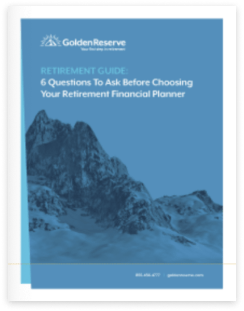Social Security: 62 vs. 66 vs. 70 – Which is Right for You to Get the Most Benefits
“When should you start taking Social Security?” ranks among the top questions researched by retirees. Social Security…
Golden Reserve

Feeling that nagging doubt about your retirement savings? You’re not alone. A recent study found just 49% of Boomers feel they’ll be financially prepared for retirement. And worse, the goal posts keep moving. The same study found the amount of money people think they’ll need to retire increased 15% in a single year, and 53% in four years.
It wasn’t long ago experts touted $1 million as the magical number; now some say $2 million. But what if that’s simply not true? The retirement industry thrives on fear, pushing the idea that you need ever-increasing sums to retire comfortably. And if you need any further evidence, consider this: 48% of American millionaires think they need to improve upon their financial plan. (Yes, really.)
The constant pressure to work “just a few more years” can become a never-ending cycle. Will those extra years truly translate into a dramatically different retirement lifestyle? Unlikely. However, it will mean less time to enjoy the retirement you’ve earned.
Breaking Free from the Myth
Big names are weighing in on the topic, adding to the confusion and anxiety. Larry Fink, the billionaire CEO of investment company BlackRock, declared a retirement age of 65 “crazy” in his 2024 chairman’s letter to investors. Financial guru Suze Orman has said retirees should have ten times their current income saved by the time they’re 67. And she really rattled anxious savers when she declared that early retirees ought to have $5 – $10 million to play it safe.
Then there is Canadian businessman and Shark Tank star Kevin O’Leary, who in 2023 made headlines for claiming you need $5 million in the bank to “survive the rest of your life, no matter what happens.” The reality is, most people never reach that amount. These figures aren’t designed to help you; they’re designed to keep your money in the market and generating fees for the financial services industry.
Many retirees find they can live comfortably on less than the often-cited millions. Social Security and pensions frequently provide a combined income of about $60,000 per year for a retired couple. This figure doesn’t even include any withdrawals from retirement savings, which, using the common 4% rule, could provide additional income. Interestingly, the U.S. Bureau of Labor Statistics reports the average annual spending for those aged 65 and older is $49,872. This suggests a significant gap of over $10,000 between the average income and spending habits of retirees.
Location, Location, Location
Here’s another important point: where you live matters. Certain states have a higher—or in some cases a much higher—cost of living than others. Hawaii, Massachusetts, California, New York and Washington are among the most expensive states in the country. We don’t need a retirement savings target to know living comfortably in these states for the long-term simply costs more money.
Take for instance Hawaii. According to a recent USA Today article, a comfortable retirement in that state equals $110,921 in annual expenses. That would require at least $2.2 million in retirement savings. This illustrates the trouble with one-size-fits-all retirement savings targets. Namely, because most of us aren’t trying to retire in Hawaii, the most expensive state in the country!
So, let’s talk about what the numbers show closer to home. The same data cited by USA Today estimates the annual cost of living for comfortably retired Midwesterners to be $57,023. That translates to a retirement savings figure just under $865,000. The calculation assumes a retirement of 25 years and takes into account housing, groceries, transportation, utilities and health care.
Find Your Equation
That said, it’s important to stress that numbers like these are estimates, not gospel. The most important takeaway is that everyone’s situation is different. Your version of a comfortable retirement may require more – or less – in annual expenses. You might choose to downsize and benefit from equity in your current home. You might choose to live in a state with a lower cost of living. Heck, you might decide you simply must retire in Hawaii. (Or perhaps just vacationing there will do.) The options are many. And ultimately, you’ll find the equation that works best for you.
Tools for Empowerment
We know figuring out where to begin in crunching the numbers can be hard, though. That’s where we can help. Innovative tools like Golden Reserve’s “income tent” offer a personalized look at your potential retirement income. By visualizing your future based on your current spending, health care, travel goals, and inflation, you can gain the confidence to make informed decisions about your retirement timeline.
Remember, retirement is about enjoying the fruits of your labor, not chasing a number. Don’t let fearmongering keep you from living the retirement you deserve.
Disclaimer: Numbers are for illustrative purposes only. Consult a professional for personalized advice.

Share this article
“When should you start taking Social Security?” ranks among the top questions researched by retirees. Social Security…
Retirement is a time to relax and enjoy the fruits of your labor. But how do you…
Ever wondered how much your financial advisor is really pocketing from your retirement nest egg? Are you…
Retirement should be a time of relaxation and enjoyment, not financial stress or regret. Unfortunately, many retirees…